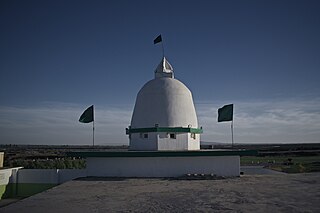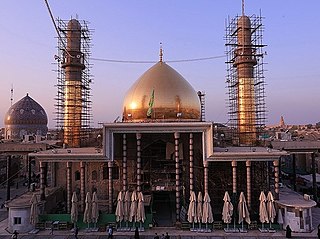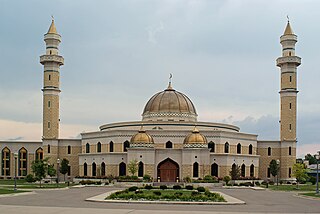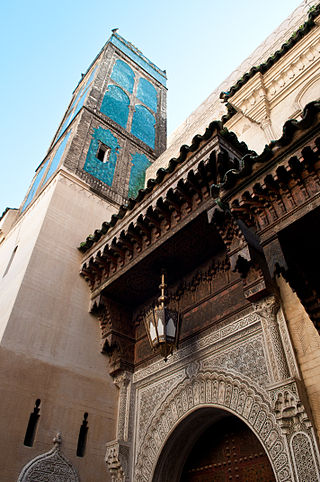
The Patriotic Union of Kurdistan is a political party active in Kurdistan Region and the disputed territories in Iraq. The PUK describes its goals as self-determination, human rights, democracy and peace for the Kurdish people of Kurdistan and Iraq. The PUK is currently under the leadership of Bafel Talabani. The PUK was founded in 1975 by Jalal Talabani, Nawshirwan Mustafa, Fuad Masum, Adel Murad, Ali Askari and Abdul Razaq Feyli. All presidents of Iraq under the 2005 constitution have been from this party.

Yarsanism, Ahl-e Haqq or Kaka'i, is an inherited, syncretic religion founded by Sultan Sahak in the late 14th century in western Iran. The total number of followers of Yarsanism is estimated to be over half a million to one million in Iran. The numbers in Iraq are unknown. Followers are mostly Kurds from the Guran, Sanjâbi, Kalhor, Zangana and Jalalvand tribes. Turkic-speaking Yarsan enclaves also exist in Iran.

The Great Mosque of Samarra is a mosque from the 9th century CE located in Samarra, Iraq. The mosque was commissioned in 848 and completed in 851 by the Abbasid caliph Al-Mutawakkil who reigned from 847 until 861. At the time of construction, it was the world's largest mosque. It is known for its 52 metres (171 ft) high minaret encircled by a spiral ramp. The mosque is located within the 15,058-hectare (37,210-acre) Samarra Archaeological City UNESCO World Heritage Site, listed in 2007.

Mahwi (1830-1906) was one of the most prominent classical Kurdish poets and sufis from Kurdistan of Iraq. He studied in Sablakh and Sanandaj in Iranian Kurdistan. He became a judge in the court of Slemani, in today's Iraq, in 1862, which was then part of the Ottoman Empire. He travelled to Istanbul and met Abdul-Hamid II in 1883. He established a khaneqah, an Islamic religious school and mosque, in Slemani and named it after an Ottoman emperor. In his poems, he mainly promotes sufism, but also deals with the human condition and existential problems, such as questions about the meaning of life.

Kurdistan Region, abbreviated KRI, is an autonomous region in Iraq comprising the four Kurdish-majority governorates of Erbil, Sulaymaniyah, Duhok, and Halabja, and bordering Iran, Syria, and Turkey. The Kurdistan Region encompasses most of Iraqi Kurdistan but excludes the disputed territories of Northern Iraq, contested between the Kurdistan Regional Government and the central Iraqi government in Baghdad since 1992 when autonomy was realized. The Kurdistan Region Parliament is situated in Erbil, but the constitution of the Kurdistan Region declares the disputed city of Kirkuk to be the capital of the Kurdistan Region. When the Iraqi Army withdrew from most of the disputed areas in mid-2014 following the Islamic State’s invasion of Iraq, Kurdish Forces entered the areas and held control there until Iraq retook the areas in October 2017.
Shaykhism is a Shi'a Islamic school founded by Shaykh Ahmad in early 19th-century Qajar Iran. While grounded in traditional Twelver Shiʻi doctrine, Shaykhism diverged from the Usuli school in its interpretation of key ideas such as the nature of the end times and the day of resurrection, the source of jurisprudential authority, and the proper hermeneutic to be employed in interpreting prophecy through the mystical writings of the Twelver Imams. These divergences resulted in controversy and ongoing accusations of heresy from Usulis and Akhbaris.

Al-Askari Shrine, the 'Askariyya Shrine or the Al-Askari Mosque is a Shia Muslim mosque and mausoleum in the Iraqi city of Samarra 125 km (78 mi) from Baghdad. It is one of the most important Shia shrines in the world. It was built in 944. The dome was destroyed in a bombing by Sunni extremists in February 2006 and its two remaining minarets were destroyed in another bombing in June 2007, causing widespread anger among Shias and instigation of the Iraqi Civil War between the country's Shia and Sunni factions. The remaining clock tower was also destroyed in July 2007. The dome and minarets were repaired and the mosque reopened in April 2009.

The history of Islam in Iraq goes back almost 1,400 years to the lifetime of Muhammad. Iraq's Muslims follow two distinct traditions, Shia Islam (majority) and Sunni Islam (minority).

The Islamic Center of America is a mosque located in Dearborn, Michigan, in the United States. The 120,000 sq. ft. facility is the largest mosque in North America and the oldest purpose-built Shia mosque in the United States, as well as the second oldest mosque in the United States after 'Asser El Jadeed which originally opened in 1924 in Michigan City, Indiana. Although the institution dates back to 1963, the center's current mosque opened in 2005. With its large Shia Arab population, Dearborn is often called the "heart of Islam", especially for Shi'ism, in the United States.
Religion in Iraq dates back to Ancient Mesopotamia, particularly Sumer, Akkad, Assyria and Babylonia between circa 3500 BC and 400 AD, after which they largely gave way to Syriac Christianity and later to Islam.
Mulla Abu Bakr Effendi, also Mulla Effendi, also Abu Bakr IV or Küçük Mulla was a senior Kurdish Muslim Scholar, Islamic philosopher, scholar, astronomer, politician, and a prominent personality from Arbil, Iraq.

Ahmed Uthman Effendi also known as Ahmed Effendi, was a Kurdish politician from Erbil who played an important role in shaping events and the direction of public administration in Iraqi Kurdistan in the first half of the twentieth century.
Abū ‘Amr ‘Uthmān ibn ‘Abd il-Raḥmān Ṣalāḥ al-Dīn al-Kurdī al-Shahrazūrī, commonly known as Ibn al-Ṣalāḥ, was a Kurdish Shafi'i hadith specialist and the author of the seminal Introduction to the Science of Hadith. He was born in the village of Shahrakhan in Erbil, Kurdistan and was raised in Mosul and then resided in Damascus, where he died.

The main religions that exist or historically existed in Kurdistan are as follows: Sunni Islam, Shia Islam, Christianity, Zoroastrianism, Yarsanism, Yazidism, Alevism and Judaism. Overall today, Sunni Islam is the most adhered to religion in Kurdistan.
An-Nur Great Mosque is a mosque located in Pekanbaru, Riau, Indonesia. Construction began in 1963 and was completed in 1968. The mosque can accommodate about 4,500 worshipers. It is one of the largest mosques in Indonesia. The mosque has influences from various architectural styles: Malay, Turkish, Arabic and Indian.

Tourism in Iraq refers to tourism in the Western Asian country Iraq. Iraq was one of the main destinations for many years, however it changed dramatically due to conflicts. The tourism in Iraq has faced many challenges, however, in recent years there has been improvements. The capital city Baghdad is the second largest city in the Arab world and the 4th largest in the Middle East. Iraq has several World Heritage Sites, dating back to ancient Mesopotamia, most notably Babylon Iraq. Iraq is considered to be a potential location for ecotourism. Erbil was chosen as "Arab Tourism Capital" in 2014 by the Arab Tourism Committee.
The Jalil Khayat Mosque is a Sunni Islamic mosque in Erbil, Kurdistan Region; the largest in the city. The mosque was begun by Jalil Khayat who died in 2005; and the mosque was completed in 2007 by his sons in memory of their father.

Great Mosque of Amadiya is a historic mosque in the town of Amedi, Kurdistan, Iraq It was first founded in 1177 during the Abbasid era, and has been renovated several times throughout its history.

The Zawiya of Sidi Ahmed al-Tijani, or Zawiya Tijaniya Al Koubra, is a zawiya, an Islamic religious complex building for education and commemoration, in Fez, Morocco. The building is located in Fes el Bali, the old medina quarter of the city. More specifically, it is situated in the Al-Blida neighborhood, close to the University of Al Quaraouiyine. It is dedicated to the founder of the Tijaniyyah tariqa from the 18th century, Sheikh Ahmad al-Tijani who is buried in the site. It is among the several other zawiyas dedicated to Al-Tijani. The complex is distinguishable from highly ornamented facades facing the street, and a minaret in turquoise color.
Ali Abdulaziz Halabji was a Kurdish Islamic scholar from Iraqi Kurdistan and one of the founders and second leader of the Kurdistan Islamic Movement.















